In Rare Interview, Buzz Aldrin Reflects on Moon Landing, 55 Years Later — and His 'Lucky' Life Now (Exclusive)
- Oops!Something went wrong.Please try again later.
- Oops!Something went wrong.Please try again later.
The last surviving crew member of Apollo 11 opens up about his pioneering voyage, the future of space exploration and why, at 94, he's "never been happier"
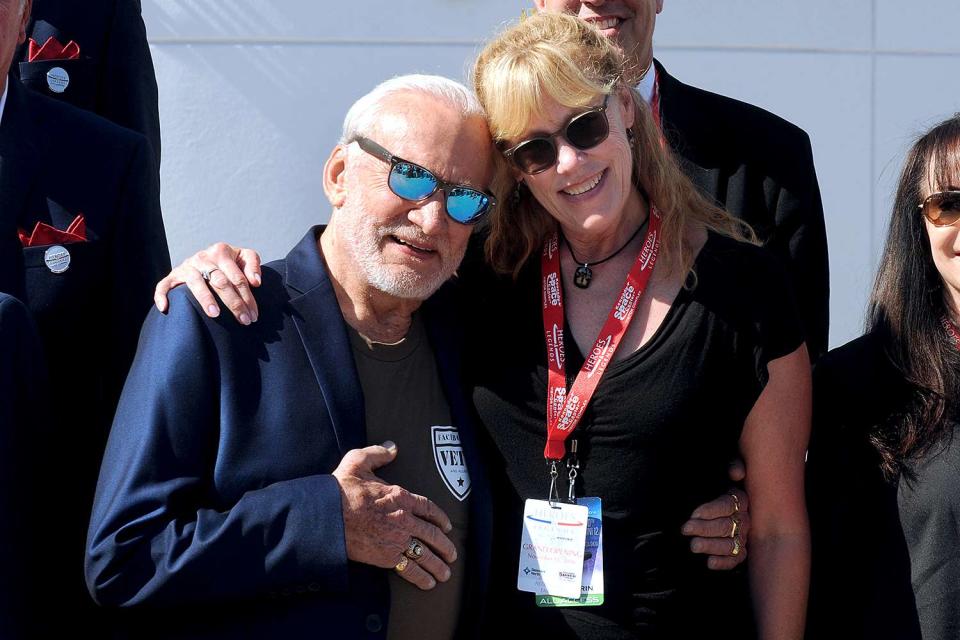
Paul Hennessy / Alamy Stock Photo
Former astronaut Buzz Aldrin (left), accompanied by his daughter, Janice Aldrin, in 2016One afternoon in July 1969, Apollo 11 astronauts Neil Armstrong and Edwin “Buzz” Aldrin were nearing the climax of their epic 240,000-mile voyage through the ink-black vacuum of deep space when all hell started breaking loose.
In less than a minute, the two spacemen were informed, they would run out of fuel and either crash onto the moon or be forced to abort their mission.
Moments earlier, their landing computer had signaled an overload but engineers at Mission Control in Houston decided it was safe to proceed.
Now they just needed to find a landing spot for the lunar module, named Eagle, on the moon’s Sea of Tranquility.
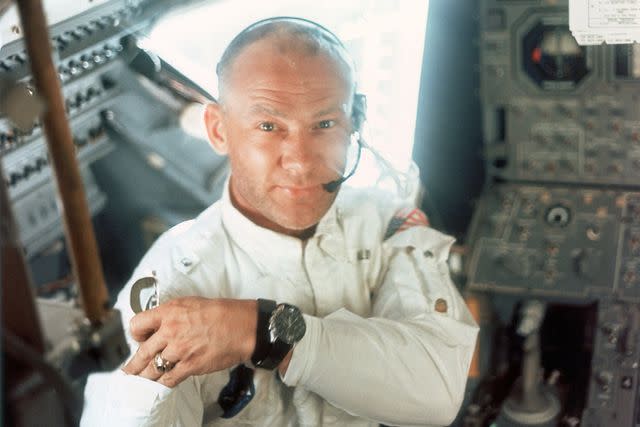
The only catch was that as they got closer to the location that NASA’s maps had depicted as smooth and level, they found themselves staring at an expanse of deep craters, littered with boulders the size of cars.
So Armstrong took matters into his own hands — switching off their landing computer and searching for a landing spot manually while Aldrin went to work calling out the Eagle’s altitude and speed of descent.
With their fuel quantity light glowing and only 15 seconds' worth of propellant left in the tank, Armstrong finally eased the Eagle down onto the dust-strewn surface at 4:17 p.m. ET on July 20, 1969.
“Houston, Tranquility base here,” he radioed to Mission Control. “The Eagle has landed.”
Never miss a story — sign up for PEOPLE's free daily newsletter to stay up-to-date on the best of what PEOPLE has to offer, from celebrity news to compelling human interest stories.
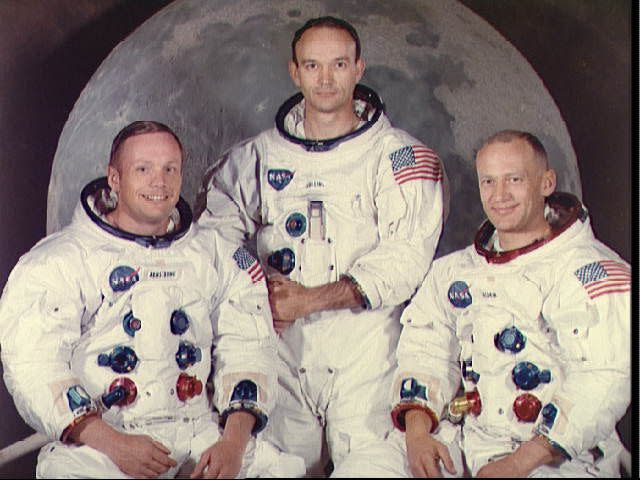
Six and a half hours later, Armstrong became the first human to step foot onto the moon’s surface just after uttering his famous one-liner: “That’s one small step for man. One giant leap for mankind.”
Twenty minutes later, Aldrin joined him outside in the scorching 200-degree heat, summing up the scenery beyond the gold-coated visor of his helmet in four words: “Beautiful view. Magnificent desolation.”
Twenty-one hours after landing, the two spacemen ignited the Eagle’s ascent engine and rocketed upward to rejoin command module pilot Michael Collins — who had been orbiting the moon in that module, called the Columbia — and then they began their two-and-half-day journey back to Earth.
On the lunar surface, they left behind a U.S. flag, various tools and a cloth patch from the Apollo 1 mission to honor the three astronauts killed years earlier when a fire swept through their command module.
The Apollo 11 crew left one more thing: a stainless-steel plague reading, “Here men from the planet Earth first set foot on the moon—July 1969 A.D.—We came in peace for all mankind.”
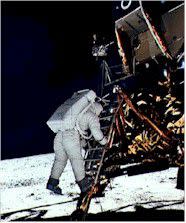
The voyage, widely heralded as “mankind’s greatest journey,” was a breathtaking national and technological achievement, involving the feverish work of some 400,000 people and costing an estimated $25 billion.
The odyssey also remains the most-watched television event in history, with an estimated 650 million viewers around the world tuning in to glimpse the grainy black-and-white footage of two astronauts walking on the moon’s ghostly gray surface.
Now 94 and recently married to chemical engineer Dr. Anca Faur, Aldrin — the last surviving Apollo 11 crew member — is opening up to PEOPLE in a rare interview, sharing his thoughts on his epic celestial adventure and what he envisions as the next frontier of space exploration.
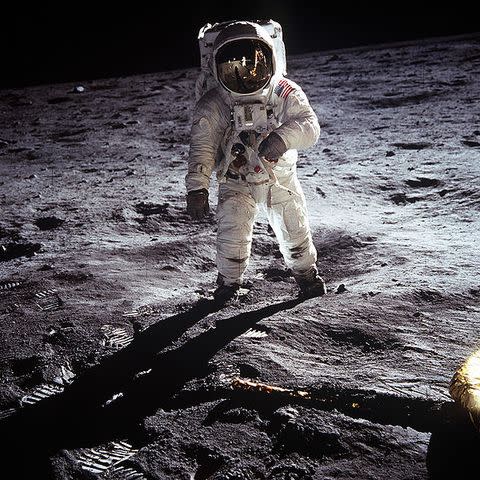
How did the Apollo 11 expedition change you — and the way humanity looks at the cosmos?
Apollo 11 — and the missions which followed — changed our understanding of human space flight, of the moon and ourselves. We wanted to fulfill President [John F.] Kennedy’s commitment: Do our jobs, do them right and beat the Soviets to the moon, while also advancing the idea of global peace.
But there is more to it and maybe I could say it this way: When we got back, we talked with each other — Neil, Mike and I — and we almost felt like we had missed the big event. While we were out on the moon, mankind — all of humankind — had come together around this human accomplishment.
So even now, this many years later, I think the mission’s success is a testament to the tens of thousands who made it possible, to American leadership — and also to the enduring possibility of human wonder, human reflection on being human, and hope for peace.
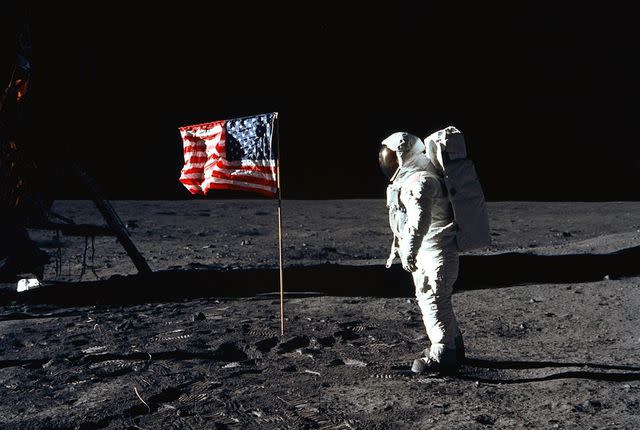
Smithsonian Networks
Buzz Aldrin shortly after planting an American flag on the surface of the moon in 1969What’s your one lasting memory of your mission to the moon?
Honestly, I have many memories about the mission, getting to and getting off the moon — and a lot of them are about teamwork, mission focus, just doing our jobs right, not letting people down.
We wanted to be as close to perfect as we could be. That’s how mission focus works. I will say — as I said on landing — that the horizon struck me as "magnificent desolation," desolate and beautiful. Neil felt that way also. I think others who explore will find a certain transcendence, a kind of arresting beauty to the place.
As for specific memories that I have gone back over, I think getting off the moon — which required quite a bit of innovation — has led me at times to wonder about our good fortune. We might have ended up stuck there, since the ascent engine circuit breaker was accidentally broken off when we reentered the lunar module [after their moonwalk].
We ended up using a pen to innovate, got it [the engine] to launch and came home. That was perhaps one of the more interesting parts of the mission.
Gratitude, I think, might be my strongest feeling, even now — gratitude for all those who made that incredible event in my life, our lives, the nation’s life happen. God looked out for us, for sure.
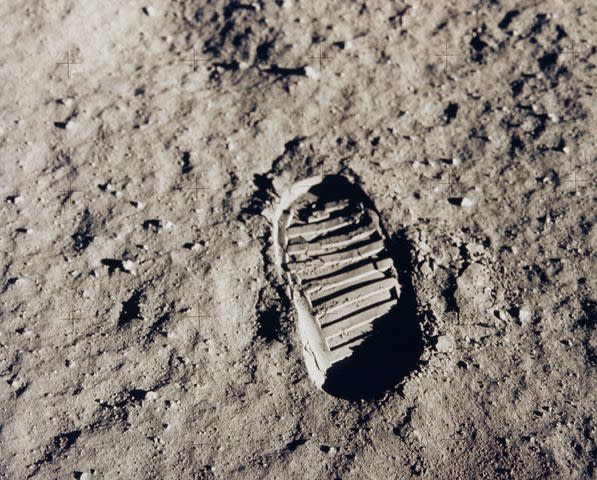
Can you describe what it felt like during that moment when you first planted your feet on the moon?
Yes, we climbed down the ladder — Neil first, then shortly afterward me. We had to jump down from the last rung to the surface, then NASA wanted us to jump back up to that rung in the moon’s gravity — I guess to get a feel for it and know we could do it. So we did that.
I think we mostly just wanted to do our jobs — and do it right. That does tend to focus you.
As a fighter pilot in the Korean War, you were well accustomed to danger and risk long before you became an astronaut. But how risky did you, Neil and Michael think the mission was going to be and what did you consider to be the most worrisome elements of the journey?
I do not think we really thought in terms of personal risk. All fighter pilots, all those who take risks for the nation get to a point very early on when they just decide that the risk for our nation, for freedom — and, in our case, for winning the space race — was worth taking.
Once you make that decision, you do not spend a lot of time thinking about it. We thought, in general terms, that we had a two-in-three chance of getting out and back safely. Those were good odds. We also thought we could manage things that were unexpected — and we did with Mission Control’s help, with training and by staying focused. We just did our jobs.
The Apollo 11 mission has been called history’s “greatest adventure.” What do you consider to be mankind’s next great adventure and why?
I have written a lot on this. I believe humankind needs to keep reaching outward in every meaning of that phrase — especially exploring space, human space exploration, getting out to Mars and establishing a permanent human presence on Mars.
Obviously, I think that getting back to the moon is important. But dreams, exploration and discovery, followed by more dreams, exploration and discovery, are at the heart of being human. For our species, for our nation and for the future of humankind, we need to keep daring, engineering and dreaming about reaching further out into the universe. We need to keep exploring.
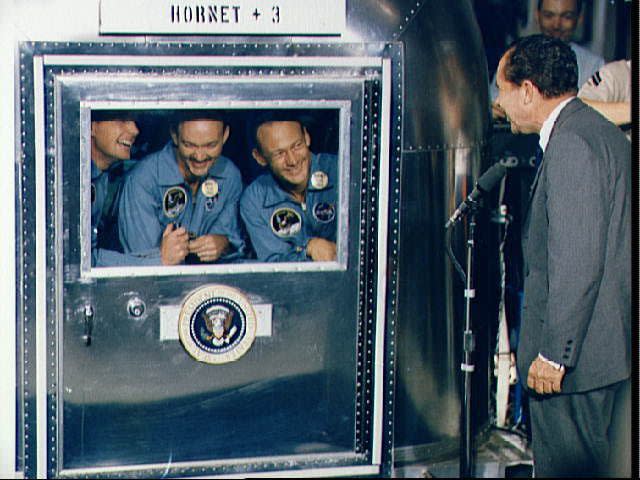
Why do you feel it's so crucial that humans not only travel to Mars but also create a permanent human settlement there?
Such a good question and so important. Humans are explorers. No group of humans are more intrepid, daring, curious and filled with wonder about things — including our universe and Mars — than Americans. We are not only big thinkers, but also big doers. We do not just dream — we do.
Mars is the next obvious home for humanity, a place that looked and felt very different long ago, and can [look that way] again. It is an obvious future home. We need to envision that future and believe we can make it happen — then do it.
I want to emphasize that my legacy is not only setting foot on the moon or being a great fighter pilot, but it is also in the future — through the "cycling pathways approach" to achieving permanence on Mars, or perhaps in some other way. Earth is precious. Humanity is precious. But Mars is the obvious next step in our species’ evolution outward.
I have written about this in depth — as have others — but it is time.
Why is space exploration so important for the future of humanity?
Again, humankind is all of us individually — and all of us collectively. We are each and all of us defined by certain attributes. Among those are a dependence on each other, wonder, curiosity, setting goals and the satisfaction of doing what we set out to do.
We’re always looking outward for the next big challenge. But there is more to it than that. We are, as a species, also survivors. We are good at focusing, planning ahead, reaching outward, thinking about contingencies and naturally exploring the future in our minds.
The further we reach with our minds, and the further we reach outward as a species, the greater the likelihood we will make new discoveries, find new truths and keep reaching in ways that protect, preserve and promote the future for all humankind.
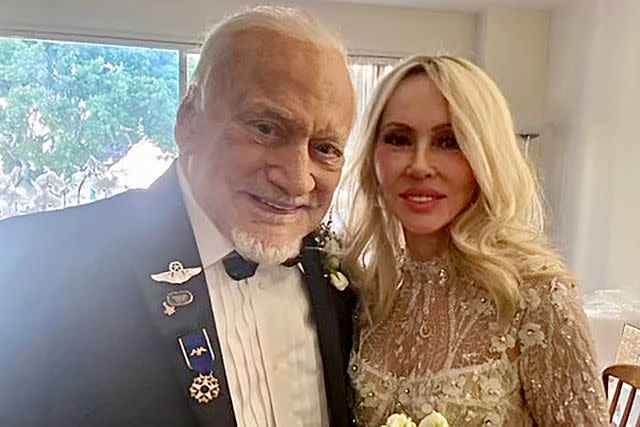
On a more personal note, how is married life treating you and what’s the next adventure that you and Anca are planning?
I have never been happier in my life than now with my time with Anca. She is the love of my life, and we do everything together, from eating meals, planning projects and watching the world go by, to meeting with our two families and celebrating — as we are at this 55th anniversary of the Apollo 11 landing. I am lucky beyond words.
And lastly, when you look up at the moon at night what goes through your mind and do you ever catch yourself thinking about those 21 hours you spent there 55 years ago?
That is a funny question — one that you might think has a simple answer. But that’s not how I think about things. I think the future is what really matters. That’s where I want to believe my legacy resides.
While I think about the [Apollo 11] mission and those who worked on it — along with all of the missions that followed — my thinking about the moon these days is simpler. We did what we had to do in our time. The nation pulled together. Everyone was focused on the moon and that was vital. It changed everything.
But now we need to think about the future, going back to the moon and then going beyond the moon. And we need to remember just how great this nation really is — because it is. There has never been a nation like this one. And the sooner we remember that, the sooner we take pride in our past, in each other, and focus on what each of us needs to do in the days ahead, the better our future will be.
For more People news, make sure to sign up for our newsletter!
Read the original article on People.

